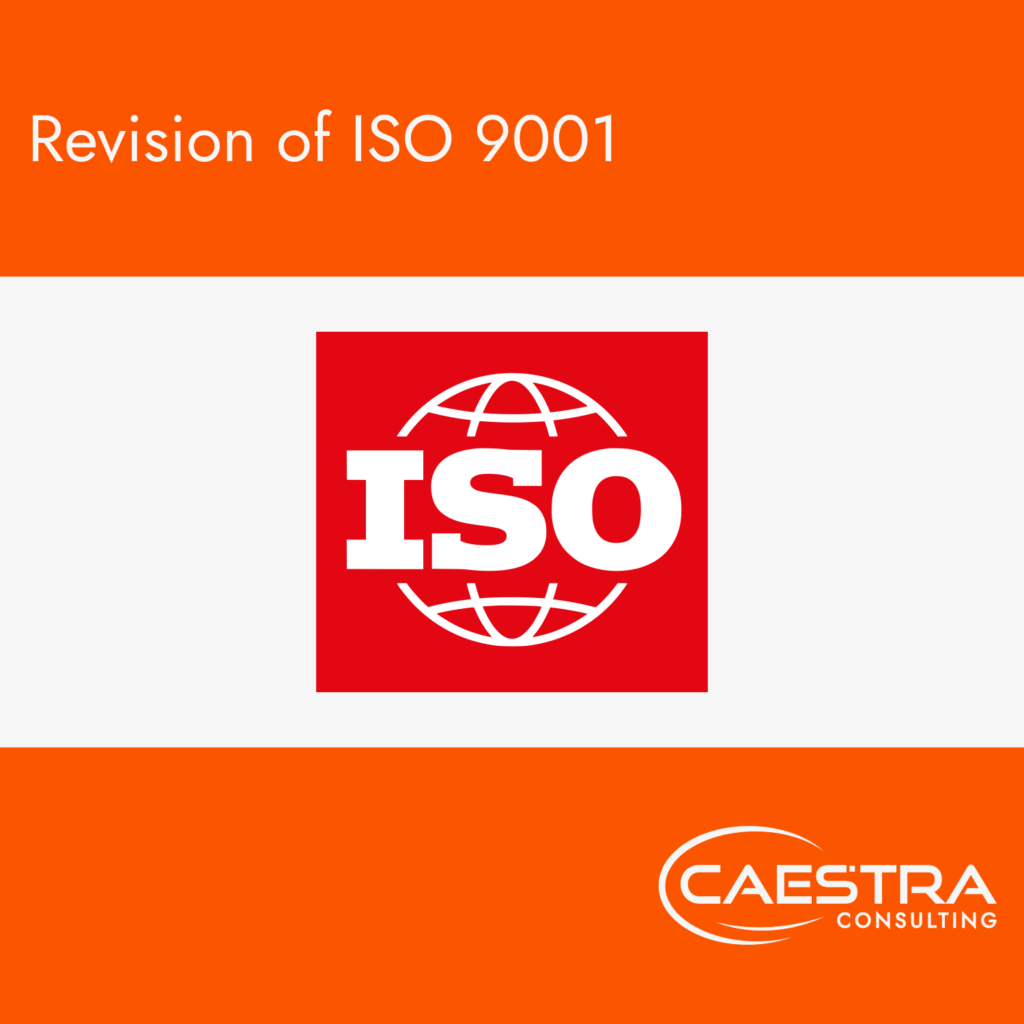
The revision of ISO 9001:2015 has been officially announced.
The International Organization for Standardization (ISO) has announced the revision of the ISO standard, which is crucial for over 1 million certified companies.
Caestra – Your quality management consultants with expertise.
Because quality is no coincidence.
Put people at the center, let technology be your partner.
Caestra – Your quality management consultants with expertise.
Because quality is no coincidence.
Put people at the center, let technology be your partner.
Quality management offers more than magic spells like Plan-Do-Check-Act and alarmingly exhausting terminologies.
Common sense meets certified expertise.
Our services:
Your benefits:
Quality means the same as happiness. What does happiness mean? Exactly!
Quality is not a defined standard, just as happiness cannot be defined as a standard. It means something different for you than it does for your customer. In the ISO 9000:2015, 3.6.2, quality is described as the degree to which a set of inherent characteristics of an object meets requirements. Requirements are also described as a need or expectation that is established, usually implied, or obligatory – ISO 9000:2015, 3.6.4.
Before you turn away in horror, let’s simplify and formulate it in German:
…when you deliver what you promise and the customer receives what they expect.
When in doubt: Because your competitor is doing it too, and the positive external impact of a functioning QM system is indisputably demonstrable.
In-depth: because the concept of quality extends far beyond meeting customer requirements.
Corporate quality permeates your entire company and affects your entire business.
Quality management begins with the “quality mindset” or “quality orientation” as an integral part of your corporate culture, positively influences operational processes along your value chain, and ultimately leads to the creation of trust and loyalty among your customers, suppliers, and stakeholders.
A “high-quality” product is actually just a “by-product” of managed quality.
Quality Management (QM) – often misunderstood, underestimated, and equated with outdated quality control systems.
The fact is: Modern QM systems are much more! They are based on process-oriented approaches, characterized by flexibility, and focus on continuous improvement.
However, ignorance and lack of information often lead to reservations about QM. Yet, QM offers significant benefits for companies of all sizes and industries.
Does this sound familiar to you too?



This prejudice often stems from experience with outdated quality control systems characterized by rigid rules and regulations. These systems resulted in extensive documentation and hindered flexibility and innovation in companies. However, modern QM systems are process-oriented and flexible.
Admittedly, the standards are still not recommended as bedtime reading, and even the German version of the standard requires a further translation into everyday German. However, once you internalize the ideas behind the system, you quickly realize that the standards nowadays provide a meaningful and, above all, lean and efficient basis for designing your business processes. The standard adapts to you – not the other way around!
Quote from TÜV: “Standardized requirements, but not a standardized system.”
Process Orientation:
Instead of prescribing rigid rules, QM focuses on analyzing and optimizing processes.
Inefficient processes are identified and replaced with improved workflows.
This flexibility allows for continuous adaptation to new requirements and challenges.
Continuous Improvement:
QM is not a static state but a dynamic process of constant improvement.
Errors and deviations are not seen as failures but as learning opportunities.
Regular audits and reflections uncover improvement potentials and measures for optimization are implemented.
Adaptability:
QM systems are not rigid but must be adapted to the specific needs and conditions of the company.
The size, industry, and corporate culture play an important role.
Modern QM software solutions offer various options for customization and scalability.
In summary, modern QM systems are anything but bureaucratic and rigid. They provide companies with the flexibility and framework to continuously improve processes, increase quality, and thus ensure business success.
Example:
A company introduces a new product. To ensure the quality of the product, a QM process is introduced, which includes the following steps:
This process is flexible and can be adapted to the specific needs of the company. It allows for continuous improvement of the product’s quality and ensures customer satisfaction.
Quality Management: A Costly Pleasure? Think Again!
A functioning QM system reduces your costs, increases your revenue, and is scalable to any company size. The claim that quality management is too expensive is a widely held misconception. In reality, investing in a QM system can pay off multiple times for companies of any size and industry.
Cost reduction through optimized processes: QM helps companies optimize their processes, reduce waste, and avoid errors. This leads to lower costs in all areas, from production to customer service.
Increase efficiency and gain resources: By optimizing workflows and automating tasks, QM saves valuable time and resources. Employees can focus on more important tasks, increasing the productivity and efficiency of the entire company.
Increase customer satisfaction and strengthen customer loyalty: High-quality products and services, along with excellent customer service, lead to more satisfied customers who remain loyal to the company and recommend it to others. This reduces customer acquisition costs and strengthens customer loyalty sustainably.
Improve competitiveness and gain market share: In a competitive environment, companies can differentiate themselves from competitors by implementing a certified QM system. Customers often prefer companies that take their quality seriously and work to high standards. QM can therefore provide a decisive competitive advantage.
Investment in the future: Quality management is not a short-term measure but a long-term investment in the future of the company. By continuously improving quality and efficiency, companies ensure sustainable success and strengthen their position in the market.
Promotion of innovation and growth: QM fosters a culture of continuous improvement and innovation. Employees are encouraged to develop new ideas and optimize processes, leading to new products, services, and business models that can drive the company’s growth.
Conclusion:
Quality management is not a cost driver but an investment factor with a high return on investment (ROI). The benefits of QM are numerous and diverse and can lead to a sustainable increase in competitiveness, business success, and customer satisfaction.
Modern QM systems are also scalable and adaptable to the needs and resources of companies of all sizes. Implementing a QM system does not have to be expensive or time-consuming.
There are numerous funding programs and consulting services available to support companies in implementing QM.
Invest in your future and let yourself be convinced by the benefits of quality management!
That’s right! Assuming your structures and processes were inefficient, error-prone, and unpredictable, and you have the will to eliminate this condition. However, if you intend to preserve your structures and processes in this state for all time, a well-implemented QM system would also support this goal. As absurd as it may sound, instead of reducing errors, you could also define error increase as a quality feature, and a QM system would function in that direction as well. Think of QM as a steering wheel for your business. Whether you want to turn left or right or continue straight ahead is up to you. QM ensures that the course is maintained, regardless of which direction you choose.
As a reminder: Quality is when you deliver what you promise and the customer gets what they expect. If you have decided to consistently and reproducibly create the worst product on earth and your customers expect exactly that, then QM is a tool of choice for achieving this goal.
QM can act as a catalyst for positive developments and help companies gradually adapt to the constantly changing market requirements. Positive developments are a relative term. Positive is what you define as positive. For your customers, a positive development means that they consistently and predictably get what they expect.
QM as a driver for continuous improvement:
Instead of enforcing rigid hierarchies and entrenched processes, QM fosters a culture of continuous improvement. Employees are encouraged to recognize improvement potentials, contribute ideas, and optimize processes. This leads to a more flexible and dynamic organizational structure that can respond faster to new challenges.
QM as a link between departments:
Effective quality management breaks down silos between departments and promotes collaboration and communication. By focusing jointly on quality and customer satisfaction, a stronger sense of unity and higher identification with the company is created.
QM as the basis for data-driven decisions:
Modern QM systems provide valuable data and information that companies can use to make informed decisions. This allows processes to be optimized, products and services to be improved, and customer satisfaction to be increased.
QM as an aid for adaptation in dynamic markets:
In a constantly changing environment, it is important for companies to be able to react quickly and flexibly to new requirements. QM can help companies develop this adaptability and maintain their competitiveness.
Conclusion:
Quality management does not lead to a radical upheaval of company structures and processes. Rather, QM acts as a catalyst for positive developments and helps companies gradually adapt to the constantly changing market requirements.
This widespread misconception severely limits the benefits of Quality Management (QM). In fact, QM can be successfully applied in companies of all industries and sizes, bringing benefits to all areas of the business.
1. QM in all industries:
QM is applicable across industries. The principles and methods of QM can be applied to all processes and services, regardless of the type of product or service offered by a company.
Examples:
Service industry: A consulting firm can use QM to improve the quality of its consulting services, increase customer satisfaction, and optimize its processes.
Retail: A retail company can use QM to ensure the quality of its goods and services, optimize the supply chain, and enhance customer satisfaction.
Public sector: A public administration can use QM to improve the quality of its services for citizens, optimize its processes, and effectively use taxpayers’ money.
2. QM beyond production:
While QM in manufacturing companies is often associated with quality control in production, it encompasses much more. QM includes all activities aimed at continuously improving the quality of products, services, and processes.
This applies to areas beyond production as well:
Research and development: QM can be used to improve the quality of research findings and new products.
Marketing and sales: QM can be used to improve the quality of marketing campaigns, sales processes, and customer service.
Management: QM can be used to improve the quality of decisions, processes, and leadership styles.
Conclusion:
QM is not an exclusive privilege of manufacturing companies. It is a universal tool that can help all companies in all industries and sizes improve their quality, optimize their processes, and ensure their business success. Modern QM systems are flexible and scalable and can be adapted to the specific needs and challenges of each company.
Investing in QM pays off:
The implementation of a QM system can lead to a range of benefits, including:
In summary, QM is a valuable tool for companies of all industries and sizes. It can lead to a range of benefits that positively impact quality, efficiency, customer satisfaction, and business success.
This widespread misconception is also unfounded. In fact, quality management (QM) can be successfully implemented in companies of all sizes and industries, leading to significant improvements.
Why QM is important for small and medium-sized enterprises (SMEs):
1. Improved quality and customer satisfaction:
By implementing a QM system, SMEs can continuously improve the quality of their products and services.
This results in more satisfied customers who remain loyal to the company and recommend it to others.
Positive word-of-mouth is particularly important for SMEs’ success.
2. Lower costs and more efficient processes:
QM can help SMEs optimize their processes and reduce waste.
This leads to lower costs and increased efficiency.
This is a crucial advantage for SMEs with limited resources.
3. Increased competitiveness:
In a competitive environment, SMEs can differentiate themselves from their competitors by having a certified QM system.
Customers often prefer companies that take quality seriously and work to high standards.
QM can therefore be a competitive advantage for SMEs.
4. Easy implementation and scalability:
Modern QM systems are modular and can be adapted to the specific needs and resources of SMEs.
There are also numerous QM tools and software solutions specifically designed for SMEs.
Implementing a QM system does not have to be expensive or time-consuming.
5. Promotion of growth and innovation:
QM can help SMEs establish a culture of continuous improvement.
This promotes innovation and the development of new products and services.
A well-managed QM system can thus contribute to the growth and success of SMEs.
Examples of QM application in SMEs:
A craft business: Implements a QM system to improve the quality of its products and services, increase customer satisfaction, and optimize its processes.
An IT company: Introduces a QM system to improve the quality of its software development processes, reduce error rates, and increase customer satisfaction.
An online shop: Uses a QM system to improve the quality of its products, delivery processes, and customer service.
Conclusion:
QM is not a privilege of large companies. It is a universal tool that can help all companies, regardless of their size and industry, to improve their quality, optimize their processes, and secure their business success.
Investing in QM is also worthwhile for SMEs. The benefits of QM are numerous and can lead to a sustainable increase in competitiveness and success.
Human values and common sense form the core of our consulting service when introducing QM systems.
We believe that enthusiasm and motivation are the key success factors for sustainable improvements in companies. Formalities and rigid standards are necessary, but they should not hinder the enthusiasm and commitment of your employees.
Therefore, in our consulting approach, we rely on a pragmatic approach that takes into account the individual needs and challenges of your company. We understand that every company is unique and must develop its own QM culture.
Plain language instead of QM jargon – common sense instead of strict adherence to norms.
The experience of a quality manager is a crucial factor for the implementation or optimization of an effective quality management system. Our experienced QM managers have already mastered a variety of challenges and have known for over 30 years how to overcome resistance through enthusiasm and common sense.
Caestra has a team of experienced quality managers who are well-versed in all areas of a company from their own operational experience. In addition, we have the necessary expertise and practical foundations for successful project implementation. We speak the language of your employees and not QM jargon – from the C-level to the loading personnel at Gate 10.
From corporate strategy to shipping documents – we know what we’re talking about.
Every company is unique – your quality management system should be too.
Our experienced consultants assist you in:
We work closely with you to develop solutions that fit your company and are supported by your employees.
Talk is silver, action is gold.
We see ourselves as partners of our clients and are happy to support you throughout the entire QM cycle. Upon request, we actively assist you in operational roles during the implementation and follow-up of your projects, even on a long-term basis – and all at fair prices. Schedule a free initial consultation today!

Up to 80% of our QM consulting costs are eligible for government funding for German-based companies. Our doors are open to you!
Your vision, our expertise.

We support you with our consulting services in implementing and applying the two most important standards for the modern working world: ISO 9000 and ISO 14000.
We operate independently in our consulting services, ensuring freedom from external influences. This includes avoiding sales partnerships or similar cooperation models with manufacturers or providers in the relevant fields.
Our analyses and recommendations are free from personal interests. We rely on a professional and neutral perspective, based on data and facts. We act in the best interest of our clients.
We communicate clearly, openly, and transparently. Our consulting services are limited to areas covered by our expertise. Discretion and care in handling your data are our top priorities.
We respect every individual and value your corporate culture. Without exception! A respectful exchange of ideas and opinions promotes collaboration and, in turn, the achievement of your goals.
We operate independently in our consulting services, ensuring freedom from external influences. This includes avoiding sales partnerships or similar cooperation models with manufacturers or providers in the relevant fields.
Our analyses and recommendations are free from personal interests. We rely on a professional and neutral perspective, based on data and facts. We act in the best interest of our clients.
We communicate clearly, openly, and transparently. Our consulting services are limited to areas covered by our expertise. Discretion and care in handling your data are our top priorities.
We respect every individual and value your corporate culture. Without exception! A respectful exchange of ideas and opinions promotes collaboration and, in turn, the achievement of your goals.
*Dear customers, in line with our principles, here you will find only a selection of anonymized references that do not allow conclusions about our clients. If you have a justified interest, we are happy to facilitate contact with the respective referees.
Wir sprechen Deutsch / Nous parlons Français / Wij spreken Nederlands
Our information service provides you with exciting insights, analyses, and trends on core topics of our consulting services.
You can find a complete overview of all articles here:

The International Organization for Standardization (ISO) has announced the revision of the ISO standard, which is crucial for over 1 million certified companies.
© Caestra Consulting
All rights reserved